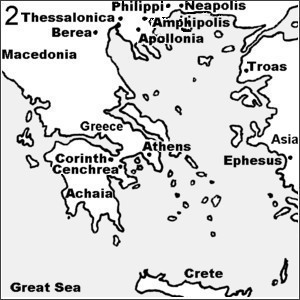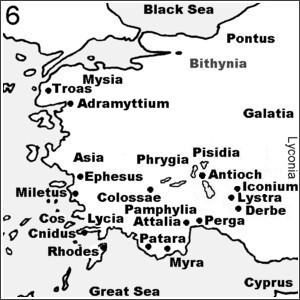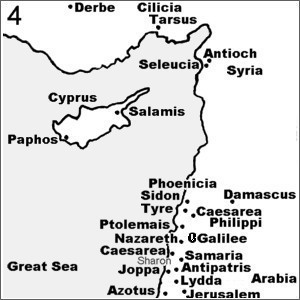
Acts 18:18-28
—Verse by verse
This page is a verse by verse study of Acts 18:18-28. These verses describe the completion of Paul’s second missionary journey. There is also a brief account of Apollos’s gospel work.
Paul’s 2nd missionary journey ends, and the 3rd begins.
Acts 18:18-28
¶“18After the Jews’ case against Paul was dismissed by Gallio, Paul stayed many more days in Corinth. Then he took his leave of the brethren, setting out to sea bound for Syria. He was in the company of Priscilla and Aquila. He had his hair cut in Cenchrea, for he'd been keeping a vow. 19They came to Ephesus where Paul took leave of Priscilla and Aquila. Paul did go into the synagogue, and he reasoned with the Jews. 20However, when they asked him to stay longer with them, he declined 21and took his leave of them. He said, 'I must do my best to keep this coming feast in Jerusalem. I will come back again to you, God willing.' So Paul set sail from Ephesus.” (Acts 18:18-21).
¶“22When Paul had landed at Caesarea, he went up to greet the church, and then went on down to Antioch. 23Having spent some time in Antioch, he departed again, going from one place to the next, through Galatia and Phrygia, strengthening all the disciples.” (Acts 18:22-23).
¶“24Now a certain Jew named Apollos, a native of Alexandria, came to Ephesus. He was an eloquent man, mighty in the Scriptures. 25This man Apollos had been instructed in the way of the Lord. Fervent in spirit, he spoke and taught accurately the things concerning Jesus —with the exception that he knew only the baptism of John. 26Apollos began to speak out boldly in the synagogue. But when Priscilla and Aquila heard him, they took him aside, and explained to him the way of God more accurately.” (Acts 18:24-26).
¶“27Apollos desired to go over into Achaia. The brethren encouraged him, and wrote to the disciples to receive him. When he got there, he greatly helped those who had believed through grace; 28for he powerfully refuted the Jews, publicly showing by the Scriptures that Jesus was the Christ.” (Acts 18:27-28).
1 Paul Goes to Ephesus with Priscilla and Aquila
Verses 18-21
¶ "After the Jews’ case against Paul was dismissed by Gallio, Paul stayed many more days in Corinth. Then he took his leave of the brethren, setting out to sea bound for Syria. He was in the company of Priscilla and Aquila. He had his hair cut in Cenchrea, for he'd been keeping a vow. They came to Ephesus where Paul took leave of Priscilla and Aquila. Paul did go into the synagogue, and he reasoned with the Jews. However, when they asked him to stay longer with them, he declined and took his leave of them. He said, “I must do my best to keep this coming feast in Jerusalem. I will come back again to you, God willing.” So Paul set sail from Ephesus." (Acts 18:18-21).

- Setting out for Syria. Paul was now ready to go back to Antioch in Syria, where his second missionary journey had started. He would first sail from Cenchrea, Corinth’s eastern seaport, across to Ephesus. Priscilla and Aquila accompanied him on that short leg of the journey; they apparently had business in Ephesus. Paul would then go by ship southwest to Caesarea not far from Jerusalem; then go down to Antioch.
- Vow, synagugue, feast. At a hasty glance, Paul may appear to have been practicing Judaism: He had been under a vow and had let his hair grow; he visited the synagogue in Ephesus; he was doing his best to get to Jerusalem for the upcoming feast. It is not necessary, however, to think that Paul was clinging the law of Moses. Jewish Christians were not expected to give up all their customs; they were only forbidden to bind them on Gentile Christians.
- We do not know the nature of Paul’s vow. In any case, the taking of vows predated the law of Moses (eg Genesis 28:20-22).
- Visiting the synagogue to reason with the Jews was one of Paul’s strategies for evangelism (eg Acts 18:4).
- The statement (in some manuscripts) that Paul wanted to keep the feast in Jerusalem does not mean that he thought keeping the law of Moses was necessary to his salvation. It most likely means that he saw it as an opportunity to counteracts the lies that had damaged his reputation; to pay a courtesy visit to the church and the apostles; and to do some evangelism among Jews from various parts of the world who would also come to Jerusalem for the feast.
- I'll come back God willing. Earlier in his second missionary journey, Paul had been forbidden to speak the word in Asia (Acts 16:6). This did not mean that God was against evangelism in Asia Minor, but it was not his priority for Paul at that time. Now Paul was in its chief city. He took the opportunity to visit the synagogue briefly and reason with the Jews. However, it was still not his priority: even though he was requested to stay and teach, he declined, wishing not to delay his journey. He simply promised to return if and when God permitted. Indeed, later in his third missionary journey, Paul would spend three years in Ephesus (Acts 20:17-20,31).
2 Paul Visits Churches in Syria and Galatia
Verses 22-23
¶ "When Paul had landed at Caesarea, he went up to greet the church, and then went on down to Antioch. Having spent some time in Antioch, he departed again, going from one place to the next, through Galatia and Phrygia, strengthening all the disciples." (Acts 18:22-23).


- At Caesarea. It's a little uncertain why Paul went so far south, to a port near Jerusalem, when he was heading for Antioch in Syria. The shortest way would be to follow the coast, go past Cyprus, and disembark at Selucia the port of Antioch. Perhaps there was not a ship available on that route. Or, most likely, his statement (missing in some manuscripts), “I must do my best to keep this coming feast in Jerusalem”, is the explanation: he wanted to visit Jerusalem before finishing his journey at Syrian Antioch.
- Went up to the church. Without the missing statement about the feast at Jerusalem, we would assume that it was the church in Caesarea that he visited. Whether it was Caesarea or Jerusalem, Luke did not record for Theophilus what took place, because it was most likely Jewish in nature, and Luke’s emphasis, in recording the second missionary journey, is on the outreach to the Gentiles.
- Spent some time in Antioch. Paul’s second journey ends where it began, in Syrian Antioch. He stays there a while before he departed again to begin his third missionary journey.
Paul’s Journeys
Traditionally, Paul is said to have made three missionary journeys, plus a fourth journey to Rome. In the Acts Facts series, I have retained this traditional manner of dividing up Paul’s several journeys recorded in the book of Acts. This enables you to more easily relate our studies with other studies, references, and maps, which most likely adhere to the same scheme.
The four journeys of Paul are...
- 1st missionary journey (Acts 13:4 to 15:35).
- 2nd missionary journey (Acts 15:36 to 18:22).
- 3rd missionary journey (Acts 18:23 to 21:17).
- Journey to Rome (Acts 27:1 to 28:16).
The first two journeys start and end in Syrian Antioch. The third journey starts in Antioch and ends in Jerusalem. The fourth journey starts in Jerusalem and ends in Rome. You can read more about Paul's trips to Jerusalem.
3 Meanwhile in Ephesus, Priscilla and Aquila help Apollos
Verses 24-26
¶ "Now a certain Jew named Apollos, a native of Alexandria, came to Ephesus. He was an eloquent man, mighty in the Scriptures. He had been instructed in the way of the Lord. Fervent in spirit, he spoke and taught accurately the things concerning Jesus —with the exception that he knew only the baptism of John. Apollos began to speak out boldly in the synagogue. But when Priscilla and Aquila heard him, they took him aside, and explained to him the way of God more accurately." (Acts 18:24-26).
- More accurately. Before describing the third missionary journey in detail, Luke takes us back to Ephesus where Paul had left Aquila and Priscilla. God has other workers besides Paul. Here we are introduced to Apollos. He is described as “teaching accurately” the things about Jesus, and as “mighty in the scriptures”. It comes as a surprise, therefore, that he did not know of baptism in the name of Christ as distinct from the baptism of John the Baptizer. Another surprise is that Priscilla and Aquilla did not contend with Apollos, or treat him as a false teacher, or have his ministry curtailed, or disfellowship him. Rather, they did the positive and fruitful thing: they privately instructed him to make his accuracy more accurate, and his might in the scriptures more mighty! And Apollos was glad to be improved.
Verses 27-28
¶ "Apollos desired to go over into Achaia. The brethren encouraged him, and wrote to the disciples to receive him. When he got there, he greatly helped those who had believed through grace; for he powerfully refuted the Jews, publicly showing by the Scriptures that Jesus was the Christ." (Acts 18:27-28).
- The brethren encouraged him. Apollos was a genuine and skilful man. The brethren recognised his value in evangelism, and encouraged him. No doubt Apollos would have carried on his work whether encouraged or not; but without that encouragement he would have been a less powerful servant of Christ. Paul has left Achaia and journeyed back to Syria. Apollos steps into Paul’s shoes in Achaia and keeps the momentum going. In our day, preachers don't need to be attacked or marginalised. They need to be made more accurate in their doctrine and encouraged in their work.